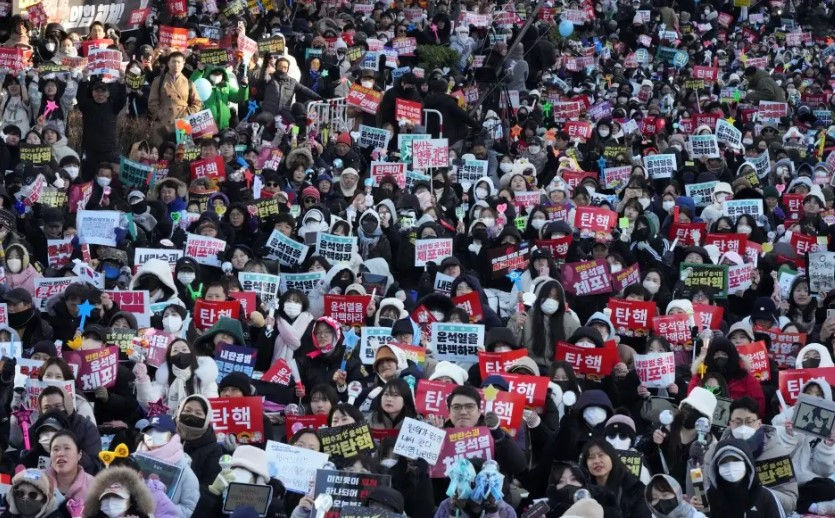In Asia, Zero Waste Is Proving to Be a Climate Solution
- Wonjeong Hong
- Mar 26
- 3 min read
Updated: Apr 23
Source
Article Summary
The words "zero waste" and "climate" are inseparable. There are many commissioners for zero waste, advocating for a better lifestyle and improving environmental pollution. However, large plastic, oil, and FMCG corporations blindly driving for profit without considering climate mitigation still exist.
Decentralized and community-led zero waste movement, aligned with the Break Free from Plastic and Stop Waste Burning campaigns, are significant for climate mitigation. According to research from UNEP, the waste sector is the third largest source of global methane emission, a key climate target and an element that is one of the main reasons for global warming. Waste segregation and organic activities alone can help reduce methane emissions by 92 percent. However, they will still take a long way to lower the temperature increase below 1.5 degrees threshold, a target set in the Paris Agreement signed by 195 countries.
Governments should intervene and make strategic policies and initiatives regarding zero waste to further advocate for solving global warming. This year's UN Climate Change Conference in Azerbaijan and next year's convention in Brazil show these efforts to mitigate climate change, especially climate financing.
Asian countries are also following these climate and zero-waste agendas, learning from the lessons of neighboring countries. One example is the Zero Waste Cities Network, a network of local government officials and zero waste advocates in Asia formed during the 2023 International Zero Waste Conference in Manila for sustainable waste management. This year, the Philippines chapter of this Network was officially launched, which is appropriate as Asia has recently experienced unprecedented rates of El Niño and La Niña. In response to the rapid climate change, many cities in Asia, such as Siqjour, Philippines; Kerala, India; Kamikatsu, Japan; Bandung, Indonesia; and Penang, Malaysia, are proceeding with innovative zero-waste initiatives.
Seeing this success, the Zero Waste Cities Network in the Philippines urged the Philippines Climate Change Commission to include zero waste in the National Climate Action Plan (NCAP) and NDCs and strategize the environmental and natural resources in every local government, emphasizing the importance of developing training programs and collaborating with the local governments to integrate the zero waste plan. The Network also called on the Commission to support the legislation for the Magna Carta for Waste Workers, which will protect workers' rights for the Environmental Justice Principles for Fast Action on Waste and Methane, which was first launched in 2023 at COP28.
Keeping the momentum going on the mitigation of climate change and integrating zero waste policies, a Regional Congress on Organoics and Climate Change is set to take place in India. The congress will be a place where government officials, policymakers, society organizations, businesses, and academics will discuss climate mitigation through waste management.
Although some challenges remain, global collaboration with different groups of people will contribute to finding, financing, and supporting the ultimate solutions to reduce methane emissions through zero waste. Also, cities, communities, and Asian countries can further develop their climate and zero-waste initiatives by learning from each other.
Reflection
After the Industrial Revolution in the 18th century, greenhouse gas emissions, including Methane, skyrocketed. One of the main reasons was air pollution from waste burning and the drastic increase in energy use for large-scale factory operations. The release of greenhouse gases has raised significant environmental issues, such as global warming and climate change.
Climate issues have directly and indirectly influenced the world. The global temperature and sea levels are rising, the Great Pacific Garbage Patch, which is three times the size of France, was formed, and wildfires are burning historical monuments worldwide. The global communities have realized the significance of these problems in recent years and many campaigns to mitigate climate change emerged. Significant conventions and agreements were made, such as the Kyoto Protocol and the Paris Agreement. Still, people are finding more effective ways to reduce the emission of greenhouse gases.
The most direct way to stop carbon emissions is to regularly stop the factories themselves, considering the realistic industrial structures. Therefore, the solution that attracted many countries' attention was the zero-waste policy. As written in the article, waste incineration and combustion emit a significant amount of Methane. Furthermore, waste products that cannot be burned or recycled are accumulated in landfills, forming large waste islands like DPDP, polluting the environment.
Many conventions and networks are being formed to collaborate on applying zero waste campaigns and initiatives to the actual life policy and train the workers about it. The article shows that Asia mainly focuses on a global and international climate network that advocates for creating zero waste policy and learning from each other. Reading the article reminded me of the importance of international cooperation in finding effective climate mitigation solutions and impacting the world.




Comments